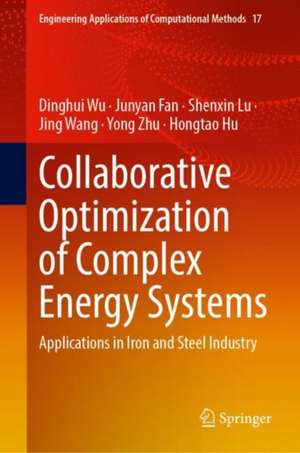Collaborative Optimization of Complex Energy Systems: Applications in Iron and Steel Industry: Engineering Applications of Computational Methods, cartea 17
Autor Dinghui Wu, Junyan Fan, Shenxin Lu, Jing Wang, Yong Zhu, Hongtao Huen Limba Engleză Hardback – 13 aug 2023
Din seria Engineering Applications of Computational Methods
- 20%
 Preț: 880.62 lei
Preț: 880.62 lei - 24%
 Preț: 898.55 lei
Preț: 898.55 lei -
 Preț: 286.28 lei
Preț: 286.28 lei - 20%
 Preț: 937.16 lei
Preț: 937.16 lei - 18%
 Preț: 790.28 lei
Preț: 790.28 lei - 18%
 Preț: 896.08 lei
Preț: 896.08 lei - 18%
 Preț: 897.81 lei
Preț: 897.81 lei - 15%
 Preț: 638.57 lei
Preț: 638.57 lei - 18%
 Preț: 732.70 lei
Preț: 732.70 lei - 18%
 Preț: 1004.19 lei
Preț: 1004.19 lei - 24%
 Preț: 928.85 lei
Preț: 928.85 lei - 18%
 Preț: 1009.54 lei
Preț: 1009.54 lei - 18%
 Preț: 959.36 lei
Preț: 959.36 lei - 18%
 Preț: 1107.73 lei
Preț: 1107.73 lei - 18%
 Preț: 939.46 lei
Preț: 939.46 lei - 20%
 Preț: 1153.97 lei
Preț: 1153.97 lei - 18%
 Preț: 736.32 lei
Preț: 736.32 lei - 18%
 Preț: 941.68 lei
Preț: 941.68 lei - 15%
 Preț: 634.00 lei
Preț: 634.00 lei - 15%
 Preț: 633.02 lei
Preț: 633.02 lei
Preț: 889.60 lei
Preț vechi: 1084.88 lei
-18% Nou
Puncte Express: 1334
Preț estimativ în valută:
170.25€ • 177.08$ • 140.55£
170.25€ • 177.08$ • 140.55£
Carte tipărită la comandă
Livrare economică 14-28 aprilie
Preluare comenzi: 021 569.72.76
Specificații
ISBN-13: 9789819945498
ISBN-10: 9819945496
Ilustrații: XIII, 145 p. 56 illus., 43 illus. in color.
Dimensiuni: 155 x 235 mm
Greutate: 0.4 kg
Ediția:1st ed. 2023
Editura: Springer Nature Singapore
Colecția Springer
Seria Engineering Applications of Computational Methods
Locul publicării:Singapore, Singapore
ISBN-10: 9819945496
Ilustrații: XIII, 145 p. 56 illus., 43 illus. in color.
Dimensiuni: 155 x 235 mm
Greutate: 0.4 kg
Ediția:1st ed. 2023
Editura: Springer Nature Singapore
Colecția Springer
Seria Engineering Applications of Computational Methods
Locul publicării:Singapore, Singapore
Cuprins
ToC will be included as soon as we receive the manuscript files.
Notă biografică
Dr. Dinghui Wu received the Ph.D. degree in Control Science and Engineering with Jiangnan University and now is a visiting fellow with the School of Computer and Electronic Engineering, University of Denver, the USA. His current research interests include energy optimization control technology, fault diagnosis of power systems, and edge calculation. Since Nov. 2019, Dr. Wu has been in School of Internet of Things, Jiangnan University, as a professor.
Mr. Junyan Fan received master's degree in Mechatronics Engineering with Jiangsu Ocean University, China, in 2021. He began his doctoral program with Jiangnan University, China, in 2021. His current research interests include energy prediction and energy optimization.
Mr. Shenxin Lu received bachelor’s degree in Electrical Engineering with Luoyang Institute of Science and Technology, China, in 2020. He took a successive postgraduate and doctoral programs of study at Jiangnan University, China, in 2022. His current research interests include energy scheduling and deep learning.
Ms. Jing Wang obtained a master's degree in power system and automation from Wuhan University, China, in 2002. Her main research directions include metallurgical industry energy management informatization, low-carbon energy-saving technology, energy process control automation, multi-media energy scheduling optimization, process industry smart manufacturing, etc.
Mr. Yong Zhu received his bachelor's degree in engineering from Huaqiao University, China, in 2019. He began his master program with Jiangnan University, China, in 2020. His current research interests are energy prediction.
Mr. Hongtao Hu received his bachelor's degree in engineering from Huainan Normal University, China, in 2019.He began his master 's degree at Jiangnan University, China, in 2020. His current research interests are energy optimal scheduling of iron and steel enterprises under multiple working conditions.
Mr. Junyan Fan received master's degree in Mechatronics Engineering with Jiangsu Ocean University, China, in 2021. He began his doctoral program with Jiangnan University, China, in 2021. His current research interests include energy prediction and energy optimization.
Mr. Shenxin Lu received bachelor’s degree in Electrical Engineering with Luoyang Institute of Science and Technology, China, in 2020. He took a successive postgraduate and doctoral programs of study at Jiangnan University, China, in 2022. His current research interests include energy scheduling and deep learning.
Ms. Jing Wang obtained a master's degree in power system and automation from Wuhan University, China, in 2002. Her main research directions include metallurgical industry energy management informatization, low-carbon energy-saving technology, energy process control automation, multi-media energy scheduling optimization, process industry smart manufacturing, etc.
Mr. Yong Zhu received his bachelor's degree in engineering from Huaqiao University, China, in 2019. He began his master program with Jiangnan University, China, in 2020. His current research interests are energy prediction.
Mr. Hongtao Hu received his bachelor's degree in engineering from Huainan Normal University, China, in 2019.He began his master 's degree at Jiangnan University, China, in 2020. His current research interests are energy optimal scheduling of iron and steel enterprises under multiple working conditions.
Textul de pe ultima copertă
This book mainly focuses on the multi-media energy prediction technology and optimization methods of iron and steel enterprises. The technical methods adopted include swarm intelligence algorithm, neural network, reinforcement learning, and so on. Energy saving and consumption reduction in iron and steel enterprises have always been a research hotspot in the field of process control. This book considers the multi-media energy balance problem from the perspective of system, studies the energy flow and material flow in iron and steel enterprises, and provides energy optimization methods that can be used for planning, prediction, and scheduling under different production scenes. The main audience of this book is scholars and graduate students in the fields of control theory, applied mathematics, energy optimization, etc.
Caracteristici
Provides optimization method of energy planning of iron and steel enterprises to reduce production cost Predicts production, storage, and consumption of blast furnace gas system Presents energy optimization methods for different production scenes
